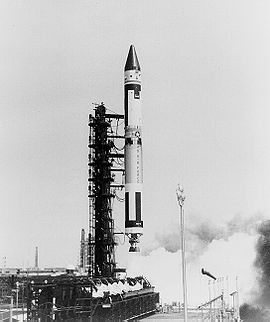Titan IIIA

Launch of the first Titan IIIA
|
|
| Function | Prototype expendable launch system |
|---|---|
| Manufacturer | Martin Marietta |
| Country of origin | United States |
| Size | |
| Height | 42 metres (138 ft) |
| Diameter | 3.05 metres (10.0 ft) |
| Mass | 161,730 kilograms (356,550 lb) |
| Stages | 3 |
| Capacity | |
| Payload to LEO | 3,100 kilograms (6,800 lb) |
| Associated rockets | |
| Family | Titan |
| Launch history | |
| Status | Retired |
| Launch sites | LC-20, Cape Canaveral |
| Total launches | 4 |
| Successes | 3 |
| Failures | 1 |
| First flight | 1 September 1964 |
| Last flight | 6 May 1965 |
| First stage | |
| Engines | 2 LR87-11 |
| Thrust | 2,340 kilonewtons (530,000 lbf) |
| Specific impulse | 302 sec |
| Burn time | 147 seconds |
| Fuel | A-50/N2O4 |
| Second stage | |
| Engines | 1 LR91-11 |
| Thrust | 454 kilonewtons (102,000 lbf) |
| Specific impulse | 316 sec |
| Burn time | 205 seconds |
| Fuel | A-50/N2O4 |
| Third stage - Transtage | |
| Engines | 2 AJ10-138 |
| Thrust | 71 kilonewtons (16,000 lbf) |
| Specific impulse | 311 sec |
| Burn time | 440 seconds |
| Fuel | A-50/N2O4 |
The Titan IIIA or Titan 3A was an American expendable launch system, launched four times in 1964 and 1965, to test the Transtage upper stage which was intended for use on the larger Titan IIIC. The Transtage was mounted atop two core stages derived from the Titan II. The Titan IIIA was also used as the core of the Titan IIIC.
The Titan IIIA made its maiden flight on 1 September 1964, but the Transtage failed to pressurise, resulting in a premature cutoff, and failure to reach orbit. A second test on 10 December was successful. Two further launches occurred in 1965 with Lincoln Experimental Satellites, before the Titan IIIA was retired.
...
Wikipedia
